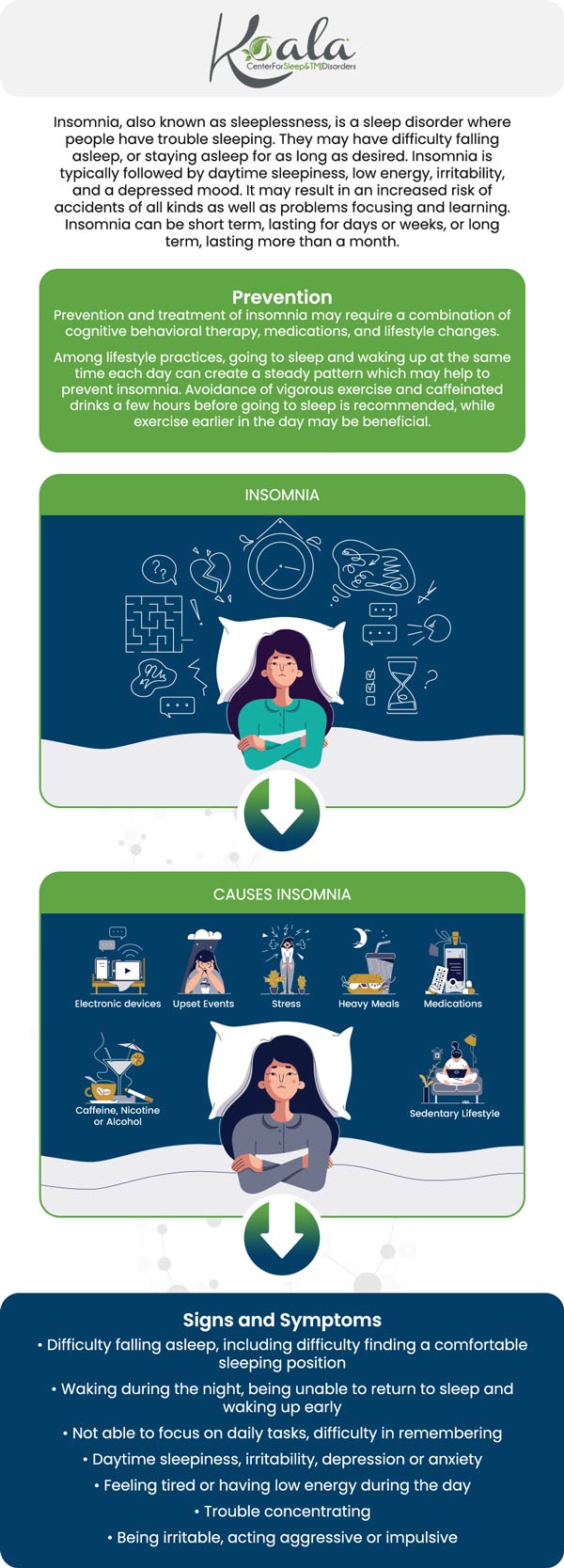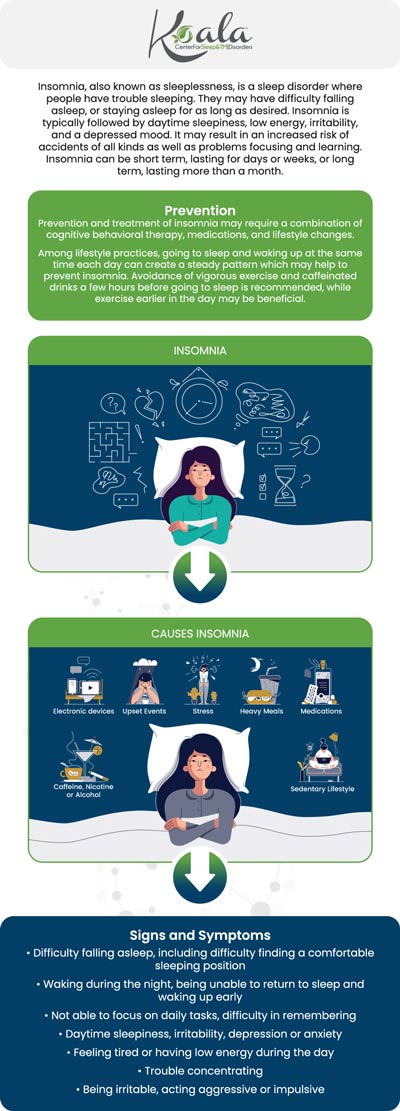What Will a Sleep Doctor Do for Insomnia?
If you have been struggling to fall asleep or stay asleep, visit the sleep doctors at Koala® Center For Sleep & TMJ Disorders today. We can help you determine what is causing your sleeping problems and find the most appropriate solution for your situation. For more information call us at one of our clinics today or request an appointment online. We serve patients from all over the USA. Locations in Bloomington IL, Peoria/Dunlap IL, El Paso TX and Wausau WI.




Table of Contents:
What will a sleep doctor do for insomnia?
What are the 3 types of insomnia?
How do you fix severe insomnia?
Although falling asleep comes easy for some, for others, it can be challenging—and even outright frustrating. Many people who struggle to fall asleep or stay asleep experience no identifiable cause, which is why it is essential to consult a sleep doctor when experiencing insomnia. Sleep doctors can help to determine the underlying cause of insomnia and work to develop a treatment plan that best addresses the unique needs of each patient.
The treatment a sleep doctor will provide for insomnia depends on the underlying cause, the severity of the condition, a history of medical conditions, and how the patient responds to treatment. If insomnia is caused by problems with the temporomandibular joint, a dentist will diagnose the situation and develop a treatment based on the patient’s individual needs. If insomnia is caused by stress, treatment options greatly differ and can range from lifestyle changes to pharmacological methods.
There are three main types of insomnia:
Acute Insomnia — Acute insomnia lasts up to one month and is commonly referred to as adjustment insomnia. It occurs due to acute situational stress such as a new job, intense workloads, or significant changes to physical and mental health. Acute insomnia typically resolves when the individual adapts to the stressor or the stressor is no longer present.
Transient Insomnia — Transient insomnia lasts for less than one week and is typically caused by another disorder, changes in the sleep environment, or mental health conditions such as stress or depression.
Chronic Insomnia — Chronic insomnia lasts for longer than one month and usually occurs in patients with an underlying risk of insomnia. It can be caused by traumatic events, mental health issues, or medical conditions that interfere with the ability to sleep.
In most cases, insomnia is a transient or short-term condition. However, it is possible that insomnia can develop into a chronic condition. For those who experience chronic insomnia, it is imperative to receive a professional evaluation by a sleep medicine specialist, such as a dentist.
The best way to ameliorate severe insomnia depends on its underlying cause, if it is acute, chronic, or transient, its severity of symptoms, and how the individual responds to treatment. If severe insomnia is caused by a medical condition, treatment will focus on addressing the condition causing disruptions to sleep. In some cases, medication may be prescribed to combat insomnia, however, these are typically a short-term solution. The following techniques have been known to improve the ability to fall asleep and stay asleep:
– Use a journal to write down worries or concerns before going to bed. Addressing them beforehand can help make a person’s mind off of worries and concerns.
– Create a relaxing environment to sleep in, with no light, low temperatures, and no sound (or white noise).
– Set a sleep and wake time routine.
– Practice breathing exercises, guided meditation, and other techniques to reduce muscle tension and control breathing and heart rate.
– When lying in bed, focus on your breathing and relax each part of your body, from head to toes. This can help relax the entire body and assist in falling asleep.
If you or someone you love is struggling with insomnia, trust the sleep specialists at Koala® Center For Sleep & TMJ Disorders to improve your quality of sleep. Our kind and compassionate professionals are experienced in treating insomnia and can help you get a better night’s rest. We are dedicated to delivering the highest level of service to each patient, at every visit. Call us today to book an appointment. We look forward to serving you!

Additional Services You May Need
▸ KoalaKIDZzz®
▸ Sleep Apnea
▸ Snoring
▸ TMJ Disorder
▸ Fatigue
▸ Sleep Disorders
▸ Weight Loss
▸ CPAP Alternative
▸ Oral Appliances




